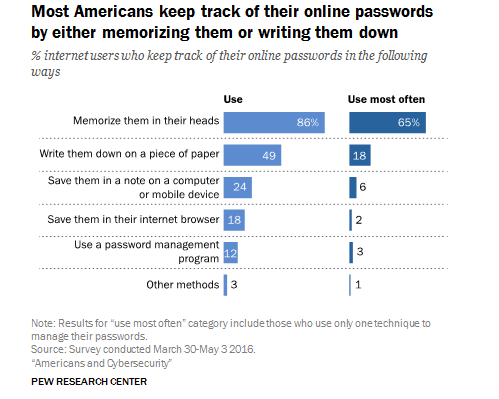Most Americans are familiar with data breaches and cyberattacks because they happen so frequently — and no one is immune. Government, businesses, and individuals all fall victim to the release of hacked information, be it emails, athletic testing results, email data, or financial information. Most often, the information released is damaging to the victim, and hackers often take advantage of that.

Previous Pew Research Center data has suggested that Americans worry about controlling their data, fearing government agencies and businesses are now unable to protect personal consumer data. In spring of 2016, the Center surveyed 1,040 adults regarding their cybersecurity habits and attitudes.
In short, it revealed that most Americans have experienced data theft or fraud, and many perceive their data as less secure, causing them to lose confidence in the institutions that protect their information. Interestingly, this does not cause Americans to use digital security best practices in their personal lives, and perhaps because of this, they expect that cyberattacks will be a future fact of life.
The Center breaks down these statistics, noting that, while 64% of Americans have been the victim of a data breach, these vary. Forty-one percent have seen fraudulent credit card charges, 35% have received notice of the compromise of sensitive information, 16% have had email accounts hacked, and 13% have had social media accounts taken over. Fifteen percent have had Social Security numbers compromised, 14% have had someone try to take out lines of credit or loans in their name, and 6% say that they’ve been impersonated in order to file fraudulent tax forms.
Approximately half of Americans believe that their information is less secure than five years ago, with those over 50 being even more likely to express this belief. They’re especially concerned with the security of the federal government and social media platforms.
Still, they’re not keeping track of their passwords in secure ways. Experts recommend that people use password management software for maximum security, but only 12% follow their advice at all and only 3% do it regularly. Sixty-five percent memorize passwords and 18% write them down on paper. Many share their password or admit to using a simple password because it is easy to remember, and 39% use similar passwords or the same password across multiple platforms. The Pew Research Center has a number of resources indicating cybersecurity best practices and recommends that users of technology seek these out.
Unsurprisingly, Americans are also fairly lax on mobile security — only 28% use a screen lock or similar security feature, and one in 10 do not install updates. Just over half use potentially unsecure wireless networks and one in five of these use such networks to perform secure activities (like checking a bank account).
And despite overarching worries about cybersecurity and poor password and device management, 69% of adults do not worry about how secure their online passwords are — even if they’ve experienced a data breach. Seventy percent expect a large attack on public infrastructure in the next five years and 66% think it will happen to our banking/financial systems. The majority of Americans believe that our government is somewhat equipped to handle it, though data was recorded before several high-profile hacking incidents.
Interestingly, Americans are fairly evenly divided on the issue of encryption — 46% believe that the government should be able to access encrypted communications during an investigation and 44% think it is okay if technology companies use encryption tools that are unbreakable to law enforcement.
Source: Pew Research Center
Advertisement
Learn more about Electronic Products Magazine





